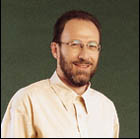Are you a journalist? Please sign up here for our press releases
Subscribe to our monthly newsletter:

Using mathematical models, scientists hope to accurately predict the behavior of the largest readily available freshwater source on earth: groundwater.
Water was the underlying force in the development of cultures worldwide, and its importance has not diminished with time. The main difference between the past and the present lies in scientific discoveries that provide us with additional information on water: its cycle in nature, its type and quality, and its condition in underground cracks and crevices, where it makes up the largest readily available freshwater source on earth.
Prof. Brian Berkowitz of the Weizmann Institute's Department of Environmental Sciences and Energy Research is developing advanced mathematical models that enable him to better understand the physical and chemical processes that control groundwater. How long does it take, for example, for escaping toxic and radioactive pollutants stored in surface and underground repositories to seep into groundwater? Once in the groundwater, how quickly do they disperse and to where? And what role do naturally occurring chemicals play?
Berkowitz's research begins with information obtained from tests carried out in various subterranean layers in Israel and abroad. In some cases he builds models the size of a household aquarium that simulate the geological structure in these layers. He and his colleagues can thus examine flow and chemical dispersion patterns in the lab. And then the challenge begins: to build mathematical models that accurately predict the behavior of groundwater and pollutants. The success of this ambitious project could help dwellers in the Middle East and other arid regions to optimally manage this most valuable resource.
Prof. Berkowitz's research is supported by the Sussman Family Center for the Study of Environmental Sciences; the Edward D. and Anna Mitchell Family Foundation, Los Angeles, California; and the Angel Faivovich Foundation for Ecological Studies,Chile.